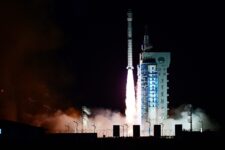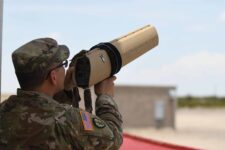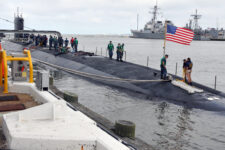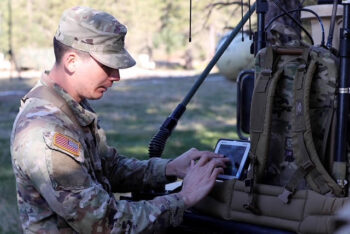
Rep. Mike Rogers, R-Ala., chairman of the House Armed Services Committee. (Credit: Andrew Harnik/AP Photo/Bloomberg via Getty Images)
WASHINGTON — As the Space Force nears its fifth birthday on Dec. 20, one of its strongest proponents in Congress is warning the service has spent too much focus on training operators for a future fight at the expense of developing technology and acquisition experts within the Guardian cadre.
“The Space Force has to be led by more than just operator. A deep understanding and connection with technology is at the core of the Space Force,” said Rep. Mike Rogers, R.-Ala., in written remarks obtained by Breaking Defense ahead of his speech today at the Center for Strategic and International Studies. “Operators, acquisition, intel, and cyber professionals must all be on equal footing,”
While welcoming the push by Chief of Space Operations Gen. Chance Saltzman (and his predecessor, Gen. Jay Raymond) for “building a warfighting culture and normalizing space as part of the joint fight,” Rogers stressed that at the same time “the development of acquisition and other professionals is just as important.
“After all, what are those operators going to operate if acquirers aren’t acquiring?” asked Rogers, who chairs the House Armed Services Committee.
“The House Armed Services Committee is going to be keeping a close eye to ensure that the Space Force is paying adequate attention to imbuing Guardians with acquisition skills,” a congressional source told Breaking Defense.
One of the primary reasons Rogers was an early proponent of the service’s creation was the pressing need for space acquisition reform, the source noted. Indeed, Rogers and his former counterpart, now-retired Rep. Jim Cooper, D-Tenn., led a bipartisan effort to create the first civilian Space Acquisition Executive (SAE) at the Pentagon to help consolidate oversight of the myriad entities with space systems buying power.
In his speech today, Rogers also advocated for growing the Space Force in order to meet the ever-increasing threats from China and Russia. However, doing so doesn’t necessarily mean “a wholesale increase in end strength,” he said. Instead, he suggested that both the Air Force and the Defense Department writ large “transfer” some of their personnel billets over to the Space Force — a move that would surely cause push-back from the offices that would lose personnel.
He also argued for more budgetary investment in the newest military service, citing both the growth in its mission areas and the highly technical nature of space operations that requires constant innovation. That said, Rogers cautioned that Congress does not want to be in the position of throwing good money after bad.
“We can no longer afford to wait 8-plus years to develop requirements, and conduct long drawn-out competition processes. Nor can we afford these endless cost-plus development contracts,” he said.
Rogers praised the progress on this front made so far by Frank Calvelli in his role as the first SAE, but said it is not enough.
“The Department must be more agile and continue to use every lever that has been given to it by Congress to 1) increase competition on these programs; 2) minimize requirement changes; 3) buy commercial; and 4) find ways to partner and draw more non-traditional companies into the defense market,” Rogers said.
Rep. Pat Fallon introducing bill to block DoD IT contracts with Chinese entities (Exclusive)
“The ‘Protecting American Innovation Act’ is vital to securing our nation’s technology and deterring foreign threats, particularly from China,” Rep. Pat Fallon told Breaking Defense.


























